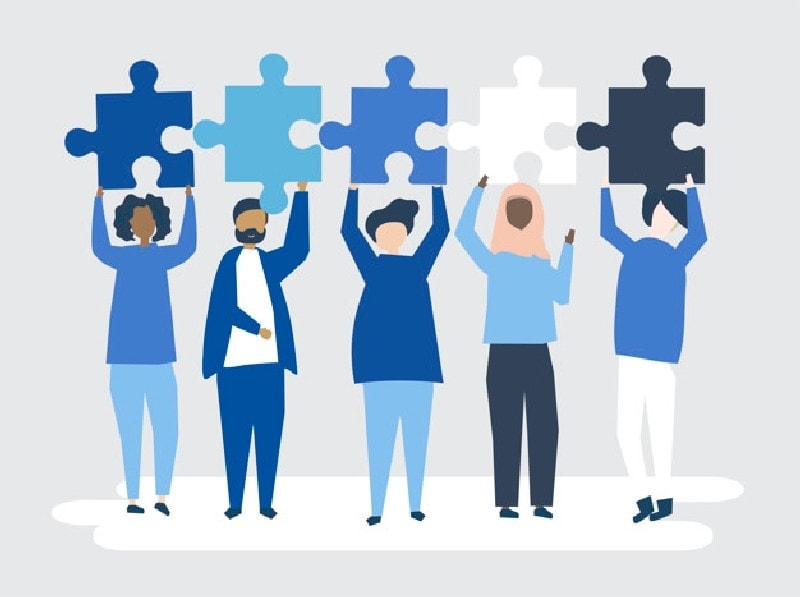Value encompasses our worldview and moral beliefs that affect how we treat others. It includes our moods, feelings, needs, wants, preferences, attitudes, and interests. Values are usually permanent and set morality and competence.
Table of Contents
What are Values?
Our words, the thoughts behind those words, and the simultaneous actions are all the results of our values. These are the foundation on which we have grown up and are also important determining factors in our future development.
Values affect emotions, conduct, and attitude directly and indirectly. They shape a person’s thinking, how he views others, and how he behaves in any situation. Values determine what is significant, unwanted, proper, improper, and good or terrible for a person. External and internal forces, culture, and tradition shape personal values.
Values guide individuals and organizations throughout their lives. They are fundamental beliefs that determine which code is appropriate in each case. Because of their circumstances, worth means something different to everyone. One person or corporation may not share another’s worth. Values are specific and can influence behavior. Change is hard in older life.
Financial situation, environment, and upbringing often influence people’s values. Thus, while some value independence over comfort, others value comfort over freedom. Several value classifications:
- Personal values: These represent people’s private priorities. Personal values may include creativity, modesty, morality, compassion, altruism, or camaraderie.
- Relational values: Represent how a person connects with others in their trajectory—friends, family, classmates, or workmates. Values include trust, kindness, understanding, and open communication.
- Societal values: These represent an individual or an institution’s relationship with society. Examples include accountability, eco-consciousness, equity, respect, individual liberties, community, and social accountability.
- Organizational values: An organization’s ethos gives it purpose, enabling effective worker and customer management. Organizational ideals include teamwork, efficiency, innovation, volunteering, and enthusiasm.
It should be noted that values may overlap between categories. Values vary by person and organization based on life and social developments. They still guide decision-making and action.
Key Takeaways
- Values cover many issues, influencing our thoughts, emotions, and actions toward others and serving as a benchmark for morality and competency.
- They govern decision-making, shape beliefs, and impact how people view and interact with the environment, and are frequently heavily influenced by culture and upbringing.
- Values are divided into four categories: personal, relational, societal, and organizational. They reflect diverse aspects of life and interactions.
- Regardless of their origins or classifications, values are a guiding force throughout an individual’s or organization’s life, difficult to change, and profoundly embedded.
- Although an individual’s or organization’s values are distinct and may vary, they continuously operate as the compass guiding actions and decisions.
Where do values originate?
Values emerge from the foundation of your beliefs and perceptions, molded by factors such as upbringing, environment, previous interactions, and family influence. Convictions are frequently formed in early life and might differ depending on cultural and geographical context. Guardians, extended family members, educators, mentors, and spiritual advisors strongly influence these views. Personal experiences also contribute to these forms, and as people grow, so do their values, which are influenced by changing life situations.
For example, while young, one may favor adventure, but as one matures and has more professional commitments, the value may shift toward responsibility and achievement. This dynamic nature of values reflects the continual impact of our interactions, experiences, and changing perceptions of our place in various contexts.
Why Are Values Important?
Values are essential for defining, shaping and directing personal and professional action. They guide our behaviors and affect our judgments, establishing a standard for what is significant in our lives. Values, as opposed to particular goals with time constraints, are long-term views that reflect what is important to us.
Understanding your personal value system can have a big impact on employment choices, leading you to roles that align with your basic principles. For example, if you value innovation, you can look for roles that promote creativity and cutting-edge work. Alternatively, if the community is important to you, you may find fulfillment in professions that promote collaboration and social interaction. Recognizing and upholding these principles can lead to a more authentic and rewarding work.
1. For an Organisation
Business involves making several everyday decisions to achieve a goal. Values are important for meeting organizational needs. Remember that strong company values enable the organization to choose to stay focused deliberately.
It values strategic relationships, productivity, growth, efficiency, and teamwork, reflecting its business practices. Values guide employees’ professional behavior and are sometimes regarded as a personal compass. A person’s inner values determine his attitude, job passion, teamwork, leadership style and ability to handle work and peer pressure.
Ultimately, company values can reflect an organization’s mission and vision and indirectly affect employee satisfaction and relationships.
2. In a relationship
Values help people connect through caring, giving, love, trust, and transparency. An individual must balance personal and professional ties with family, friends, coworkers, and acquaintances. Values are the secret weapons influencing relationship behavior and often represent ultimate aims and ambitions.
Values affect relationship comprehension and comparability and influence behavior. Determining what you like and can tolerate and what you hate reduces baggage.
To avoid wasting time, effort, and energy on useless relationships, clear out the clutter. Values assist you in deciding who to value and who to ignore.
3. For Individuals
An individual’s value notion motivates him to justify his conscious or unconscious behavior. It affects his thinking and behavior. Family, friends, school, neighborhood, and other sources teach these early on.
Individuals follow certain values to suit their wants, which influences work life balance and their conduct. A person’s values and life principles come from his upbringing. Humility, inventiveness, understanding, enthusiasm, humor, and personal fulfillment reflect life values. Our childhood values pile up as we get older.
Love, friendship, and kindness are typical qualities throughout childhood, but gratitude, tolerance, and understanding are added as we expand our horizons. Values help people find their purpose.
Understanding situations and comparing them to his principles helps him determine his preferences, likes, needs, and wants.
4. Personal life
Values shape a person’s daily behavior. They become part of our lives and personalities throughout time and are reinforced and shared by others. Everyone acts with respect, intelligence, friendship, and love.
Personal values help a person relate to and behave with others. Because they shape culture and personality, they vary by person and culture. Values ensure a person acts as he has in mind. In critical situations, a person must make a speedy decision.
In the present, engrained values help you react to social, personal, and professional situations as if you had time to deliberate. It helps you align your instincts, behaviors, and decisions.
5. Attitude and Behavior
Values guide life goals and reflect life’s priorities. They affect practically every element of our personal and professional lives; thus, they are not situational. When asked about your values, you’ll be stumped momentarily, then try to recall them.
Our values have been imprinted on us from birth due to our environment, culture, and contacts. Most people are ignorant of their values, even if their behaviors reflect them. Values help people make good decisions once they understand them. It shapes a person’s attitude, conduct, and response to people and situations.
Values help make quick decisions, making it easier to think quickly. This helps you seize most opportunities. In addition, our behavior values help us forecast a person’s attitude, choices, and conduct. This normally prevents mistrust, frustration, and misunderstandings.
6. Choosing the right career
Career choice is difficult because many yes, no, and maybes exist. At first, most people are unsure about their path or whether it will be successful.
Values can help you choose a career path to grow and enhance your career. Life values help determine if a work profile matches your core company values and goals.
When you start comparing options and values, one essential question will be answered easily: Will your values and mission match those in your business so that your personal and professional lives function together?
7. Values are important for Making decisions
Knowing and following your life principles helps you make decisions. It also fosters self-confidence that shapes influential attitudes on crucial issues. His perception improves as he learns right from wrong, bringing clarity to his thinking.
Values boost confidence and provide safety and stability. Knowing your life needs makes it easier to focus and make decisions.
8. Society
Values help people progress and increase productivity. They support shared actions and allow individuals and society to grow. Our lifelong values shape our attitudes, opinions, and perceptions.
Values are important because they help society attain goals. These provide the standard for social behavior and morality, so everyone knows what is acceptable and what is not. Individuals form society.
A good value structure improves relationships, which enhances society’s progress and prosperity. Sharing core ideals speeds up their application so society can function in an orderly. It gives purpose and helps solve social concerns quickly and satisfactorily. As shown, social values merge individual difficulties into a community problem.
It affects practically everyone in that culture, leading to shared solutions and improving harmful behavior. Values help develop society as a whole by supporting everyone without bias or prejudice. Respect between society members makes coexistence beneficial.
Social interactions foster positive personalities that improve society and personal well-being. Children, the future of that civilization, learn values in their early and formative years, which shape their minds. Good and reliable principles assist in establishing a society that produces confident, self-assured people.
9. A workplace or an organization
Values are typically cited as a lifelong norm of conduct because they reflect our character and morality. Good work ethics and workplace principles are essential for a calm and pleasant workplace. Times are changing, and businesses are looking beyond personal profit.
With social consciousness at its peak, every firm seeks long-term prospects and focuses on its principles and mission. Working together on common principles taps into people’s natural good conduct and fosters camaraderie. Remember that a company’s efficiency and productivity depend on its personnel.
If the company wants to expand, it must promote morality in its personnel. Values influence interpersonal conduct, positivism, business strategy, and employee happiness, improving organizational functioning and performance.
Benefits of identifying your values
Discovering your values can act as a compass as you navigate adulthood, especially when making important decisions and creating your profession. Identifying your basic values provides different advantages.
1. Facilitates problem-solving and decision-making
Knowing and understanding your core views will help you in tough situations that make it hard to make decisions and solve problems. Let your values help you decide what to do when things get tough. Instead of acting on impulse, take a moment to ensure that your response aligns with your values. This will help you come to a more honest and effective answer. Let’s say you care about understanding and come across someone sad. Helping others is not only a nice thing to do but also makes you more empathetic.
2. Identifies priorities
Identifying your key values allows you to focus on what is truly important while removing the less meaningful aspects of your life. Pay close attention to your daily decisions and write down what matters most. This self-awareness elevates the worth of your time and enables you to live your life fully.
3. Increases your self-confidence
Recognizing your values promotes self-confidence by providing a sense of self-awareness and belief, which is beneficial in job interviews and the workplace. This self-assurance can help you handle complex problems, overcome hurdles, and communicate more effectively with coworkers, peers, and superiors.
4. Enhances your career options
Your beliefs can significantly impact your professional choices, allowing you to make more informed judgments at work. If you value independence, consider working as a freelancer or entrepreneur. Alternatively, if lifelong learning is vital to you, a academic career could be ideal. The start of your career can also be a learning curve for clarifying your ideals and bringing you to a role consistent with your core beliefs.
Tips for discussing values in an interview
When navigating an interview, emphasizing your values effectively can set you apart from other candidates. Value alignment is frequently a determining factor in landing a role that fits you, and you fit it. Let’s look at strategies to discuss values confidently and truthfully.
- Reflect on the company’s values: Before entering the interview room, familiarize yourself with the company’s ethos. Visit its website, read its mission statement, and learn its basic principles. This insight allows you to compare its values to your guiding principles.
- Personalize Your Value Proposition: When asked to introduce yourself or share your personal experience, identify the key values that define you. These should resonate with the role you’re hoping to land. Concrete examples, such as a volunteering experience demonstrating your devotion to community service, would help embed these principles in reality rather than abstract phrases of ‘teamwork’ or ‘integrity.’
- Incorporate Values into Your Responses: Weave your values easily into the answers as you address situational and behavioral concerns. Have you been asked about a difficult project deadline? Discuss how your diligence and persistence helped to ensure quality work. Here, your narrative can demonstrate your ability to balance pressure with performance, which many employers value.
- Show Genuine Enthusiasm for Shared Values: If you discover similarities between the company’s values and your own, convey genuine enthusiasm. This can help you connect with the interviewer and show that you’re interested in being a part of the company’s culture and mission, not just the role.
Conclusion
Values are fundamental principles that guide our actions, decisions, and interactions in personal, professional, and societal contexts. They affect our views, motivate our behavior, and influence our life routes. Embracing and connecting with our core principles improves decision-making, confidence, and job happiness. Values enable us to live successful lives, form meaningful relationships, and benefit our communities, capturing the essence of our identities and the legacy we want to leave.
Liked this post? Check out the complete series on Marketing




